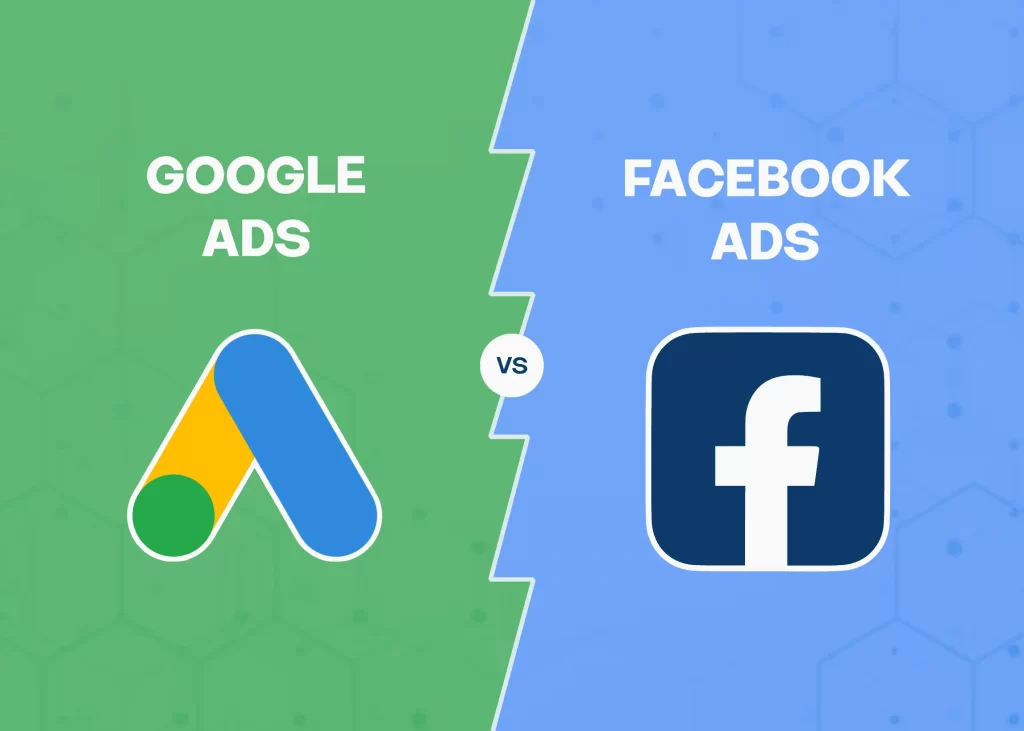In this digital era, businesses reach their target audiences through powerful online advertising platforms.
Among the frontrunners, Google Ads and Facebook Ads dominate the market, offering diverse features and functionalities.
While Google is known for its search-based ads, Facebook boasts a vast social media user base.
Understanding their differences and strengths is crucial to determine the best fit for your marketing objectives.
In this blog, we will discuss Google Ads Vs Facebook Ads, and which advertising platform is better for businesses in 2024.
Table of Contents
ToggleGoogle Ads Vs Facebook Ads | How They Are Different from Each Other
Targeting Capabilities
Google’s immense reach allows you to target potential customers based on their search queries.
With keyword targeting, you can display your ads when users search for specific keywords related to your products or services.
Google also offers location-based targeting, which ensures users see your ads in specific regions.
Facebook offers an array of targeting options, leveraging users’ demographic data, interests, behaviors, and even life events.
This granular targeting allows you to reach a highly relevant audience, making it ideal for businesses connecting with a specific niche.
Ad Formats and Creatives
Google offers a range of ad formats, including search ads, display ads, video ads, and app promotion ads. Each format caters to different marketing objectives.
For instance, display ads can enhance brand visibility, while video ads can engage users with captivating visuals.
On the other hand facebook’s ad formats are designed to seamlessly integrate with users’ feeds, including photo ads, video ads, carousel ads, and more.
The platform’s visually engaging content allows businesses to tell their brand stories effectively.
Cost and Bidding Strategies
Google Ads:
Google employs a pay-per-click (PPC) model, where advertisers only pay when users click on their ads.
Bidding on popular keywords can be competitive, affecting the cost. Strategic keyword selection and bid management are essential to maximize ROI.
Facebook Ads:
Facebook’s bidding strategies offer flexibility, including cost-per-click (CPC), cost-per-impression (CPM), and optimized bidding. Advertisers can set daily or lifetime budgets, controlling their ad spending effectively.
Ad Performance Tracking and Analytics
Google Ads:
Google’s comprehensive analytics tools provide valuable insights into ad performance, keyword effectiveness, and conversion tracking.
The platform’s data-driven approach enables advertisers to refine their campaigns continuously.
Facebook Ads:
Facebook’s ad manager offers in-depth analytics, tracking ad engagement, click-through rates (CTR), and audience demographics.
These insights help businesses understand their campaign impact and optimize accordingly.
Which is More Costly or Cheap
The cost of advertising on Google and Facebook varies based on factors such as industry competition, target audience, and ad relevance.
In general, Google Ads tend to be more expensive due to high competition for popular keywords.
On the other hand, Facebook Ads often offer a more budget-friendly option for businesses, particularly with precise targeting options.
Which Has More Quality Audience
The quality of the audience on both platforms depends on your business’s niche and target market.
Google Ads cater to users actively searching for specific products or services, indicating high purchase intent.
In contrast, Facebook Ads tap into users’ interests and behaviors, enabling businesses to engage with potential customers in a more casual context.
The choice between the two depends on your product/service and the stage of your sales funnel.
FAQs About Google Ads Vs Facebook Ads
Q1. Can I use both Google Ads and Facebook Ads simultaneously for my marketing campaigns?
Ans: Absolutely! Many businesses use a combination of both platforms to reach different segments of their target audience and diversify their marketing efforts.
Q2. Which platform is better for promoting a premium product?
Ans: Google Ads might be more suitable for promoting premium products, as users actively searching for such products are likely to have a higher purchase intent.
Q3. How do I decide which platform is best for my service-based business?
Ans: Consider your target audience and their online behavior. If you need precise targeting based on interests and behaviors, Facebook Ads may be a better fit.
Q4. Are Facebook Ads suitable for promoting low-value goods?
Ans: Yes, Facebook Ads can be effective for promoting low-value goods, as they allow you to reach a broad audience cost-effectively.
Q5. How can I choose the best advertising platform for my business?
Ans: Evaluate your marketing objectives, target audience, and budget. Experiment with both platforms to determine which one delivers better results for your specific business needs.
Conclusion
In conclusion, both Google Ads and Facebook Ads are powerful marketing platforms, each with its unique strengths.
Choosing the best platform in 2024 depends on your business type, marketing objectives, and target audience.
For businesses seeking immediate conversions and targeting users with high purchase intent, Google Ads may be the preferred choice.
On the other hand, Facebook Ads offer robust targeting capabilities, making it an excellent choice for businesses aiming to build brand awareness and engagement.
















Select your comment provider from settings.